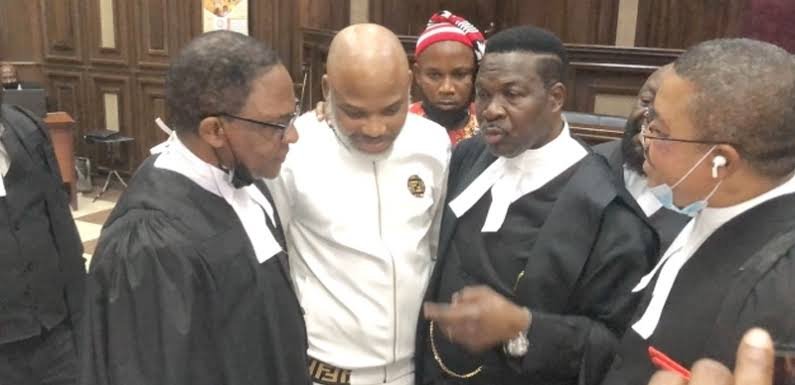IPOB: What Nnamdi Kanu’s lawyer said after Supreme Court ruling

Following the Supreme Court ruling, Aloy Ejimakor, Special Counsel to Nnamdi Kanu, leader of the Indigenous People of Biafra, IPOB, has announced the next course of action.
Kanu’s legal team, according to Ejimakor, will file a bail application at the Federal High Court in Abuja.
He spoke to Platinumtimes shortly after the Supreme Court denied Kanu’s release order.
The Supreme Court overturned the Appeal Court order that dismissed and acquitted Kanu of all terrorism charges in October 2022 in a decision given by Justice Emmanuel Agim but written by Justice Garba Lawal.
The Supreme Court ruled that, while the Nigerian government recklessly and illegally deported Kanu from Kenya, such an illegal act did not preclude any court from proceeding with the trial.
Justice Lawal ruled that no Nigerian law was invoked in the action seeking Kanu’s release based solely on his wrongful detention in Kenya.
The judge stated that for the time being, the remedy for such action is for Kanu to file a civil issue against such an act rather than removing the courts’ jurisdiction to continue with his prosecution for suspected criminal crimes.
Kanu was then directed by the Supreme Court to defend himself in the remaining 7 counts of terrorist allegations against him in the Federal High Court.
In response to the proceedings, Ejimakor stated that he expected the Supreme Court to uphold the Appeal Court’s decision.
According to Ejimakor:
“I had high hopes that, based on the law of extradition, the Supreme Court should have affirmed the discharge order made by the Court of Appeal.
“Yes! First, we shall proceed with apace bail application to reinstate his bail in line with the ruling of the Supreme Court.”
Ejimakor also expressed dissatisfaction with the ruling of the Supreme Court on Kanu’s extraordinary rendition from Kenya.
He said:
“I am not satisfied with the Supreme Court’s discountenance of the extraordinary rendition, because it does not comport with the doctrine of fair hearing.
“The Supreme Court justified its position on the theory that our jurisprudence has not developed to the point of recognizing extraordinary rendition as a barrier to prosecution. That is so wrong because it implies that Nigerian jurisprudence is primitive, behind the times and retrograde.”
